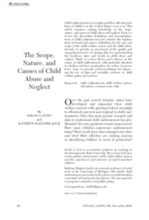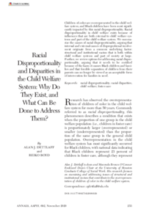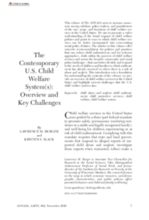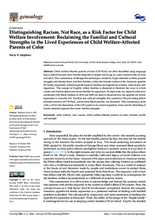Displaying 371 - 380 of 2221
This article examines existing knowledge on the scope, nature, and causes of child abuse and neglect in the U.S.
This article summarizes the causes of racial disproportionality, arguing that internal and external causes of disproportional involvement originate from a common underlying factor: structural and institutional racism that is both within child welfare systems and part of society at large.
This introduction sets a foundation for understanding the contents of this volume of The ANNALS, which aims to increase awareness among scholars, policy-makers, and practitioners of the size, scope, and functions of child welfare services in the United States.
This article provides an overview of the funding streams that finance the U.S. child welfare system, reviews the federal legislation since 1970 that has led to the current funding structure, and ends with a discussion of how the Family First Prevention Services Act of 2018 has the potential to create better outcomes for children and families by promoting prevention activities and program support with strong evidence of success.
This article considers how U.S. child welfare agencies can best leverage the opportunities presented by the Family First Prevention Services Act of 2018 while addressing potential barriers posed by the paucity of evidence-supported prevention programs and avoiding the unintended consequences of limiting reimbursement to only selective prevention services that meet rigorous evidence standards of effectiveness.
The author of this article analyzes young people’s experiences in foster care from a life course perspective, accounting for when foster care happens, how long it lasts, and what happens when foster care placements end.
"The [U.S.] Trump administration separated far more children — the latest total stands at more than 5,500 — starting much earlier than it initially acknowledged," says this piece from NPR. "And more than 1,400 parents were ultimately deported without their children, according to immigrant advocates." The former administration had refused to allow parents who'd been deported back into the U.S. to reunite with their children. "Now all eyes are on Biden."
This webinar will provide an overview of how Family Resource Centers' pandemic response has raised their profile.
"The Justice Department formally rescinded the Trump administration's controversial 'zero tolerance' policy that called for the criminal prosecution of adults crossing the border and led to the separation of thousands of families, according to a memo obtained by CNN," says this article from CNN.
This commentary challenges the stereotypes created by hyper-attention to the struggles of child welfare-affected parents of color (CW-PaoC) and situates them, and their families, within the broader context of the American appetite for family separation, wherein specific types of families are targeted for scrutiny, intervention and regulation.




